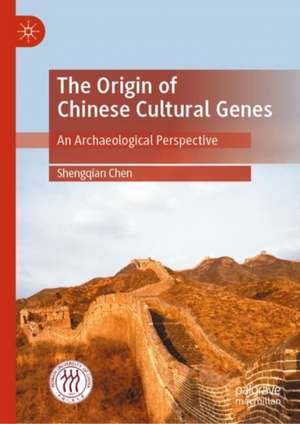The Origin of Chinese Cultural Genes: An Archaeological Perspective
Autor Shengqian Chenen Limba Engleză Hardback – 31 oct 2024
Preț: 703.38 lei
Preț vechi: 827.51 lei
-15% Nou
Puncte Express: 1055
Preț estimativ în valută:
134.63€ • 146.29$ • 113.17£
134.63€ • 146.29$ • 113.17£
Carte tipărită la comandă
Livrare economică 21 aprilie-05 mai
Preluare comenzi: 021 569.72.76
Specificații
ISBN-13: 9789819709823
ISBN-10: 9819709822
Pagini: 250
Ilustrații: Approx. 250 p.
Dimensiuni: 148 x 210 mm
Greutate: 0.6 kg
Ediția:2024
Editura: Springer Nature Singapore
Colecția Palgrave Macmillan
Locul publicării:Singapore, Singapore
ISBN-10: 9819709822
Pagini: 250
Ilustrații: Approx. 250 p.
Dimensiuni: 148 x 210 mm
Greutate: 0.6 kg
Ediția:2024
Editura: Springer Nature Singapore
Colecția Palgrave Macmillan
Locul publicării:Singapore, Singapore
Cuprins
Part I: An Archaeological Perspective.- Chapter 1: The Mindset of Archaeology.- Chapter 2: The Secret of Archaeological Inference.- Chapter 3: What are Inside Objects?.- Chapter 4: Long Duration’s Charm.- Part II Cultural Origins.- Chapter 5: Insights from Prehistory: How Did Humans Evolve?.- Chapter 6: Back to the Mousterian Puzzle: The Mystery of Stone Tools.- Chapter 7: Crossing Eurasia: The Altai Paleolithic.- Chapter 8: The Origin of Division of Labor and Exchange.- Chapter 9: The Story of Longquan Cave.- Chapter 10: The Drunken Archaeologist.- Chapter 11: Return from Tongtian Cave: Reflections on Cultural Modernity.- Chapter 12: Contemplating the Origin of Spirituality.- Chapter 13: Archaeological Reflections on Plagues.- Chapter 14: Technology, Society, and Consequences.- Part III: Agriculture and the Origins of Civilization.- Chapter 15: Looking Back at the Agricultural Age.- Chapter 16: Reflections on Sociality.- Chapter 17: The Archaeology of Social Networks.- Chapter 18: TheSocial Evolution of the Feast.- Chapter 19: Yumin: The Beginning of the Steppe Neolithic.- Chapter 20: Diffusion, Exchange, and Competition in Prehistoric Chinese Agriculture.- Chapter 21: Reflections on Prehistoric Economics: Social Conflicts and the Origins of Agriculture.- Chapter 22: The Spatial Expression of Social Power.- Chapter 23: Tracing Chinese Civilization as a System.- Chapter 24: Why is Xia a problem?.- Chapter 25: The Cultural Ecotones: An Important Link in the Cultural Landscape of Prehistoric China.- Chapter 26: The Origins of Chinese Civilization from a Pluralistic Perspective.- Part IV: The Formation and Inheritance of Cultural Genes.- Chapter 27: What Makes Cultural Genes Possible?.- Chapter 28: General Trends.- Chapter 29: The Cultural Genes of Prehistoric China.- Chapter 30: The Early Roots of Chinese Cultural Genes.- Chapter 31: The Spiritual Core of the Cultural Gene.- Chapter 32: Culture as a Form.- Chapter 33: Materiality and Material Consumption.- Chapter 34: Cloud Broadcasting and the Inheritance of Traditional Culture.- Chapter 35: Traveling Through Time and Space.- Chapter 36: The Chinese-Style Wonderful Life.- Chapter 37: Sjara-osso-gol: The Sustainable Development of a Resource-Based Region.- Chapter 38: Why is Involution Not a Problem.- Chapter 39: Archaeology as Cultural Construction.
Notă biografică
Shengqian Chen is a professor and doctoral supervisor of the Department of Archaeology and Museum at the School of History, Renmin University of China. Born in Jiayu, Hubei in 1972. In 1993, he graduated from the School of Archaeology, Jilin University with a bachelor's degree. In 1996, he graduated from the Department of Archaeology of Peking University with a master's degree. In 1998, he went to the Southern Methodist University of the United States to study for a doctor's degree under Dr. Fred Wendorf, former president of Society for American Archaeology , and Dr. Lewis R. Binford, the leader of "New Archaeology". In 2004, he received a doctor's degree. His main research fields include archaeological theory, prehistoric archaeology, stone tools analysis, etc. His works include Prehistoric Modernization, Thinking Archaeology, Learning Archaeology, Human Questioning, etc., and his translations include In Pursuit of the Past: Decoding the Archaeological Record , Archaeology: Key Concepts, Thinking Small: Global Perspectives on Microlithization, etc.
Textul de pe ultima copertă
This book first traces the evolution of Chinese culture, which has a triple structure. It traces back to the economic basis of the formation of Chinese culture and analyzes the pattern of the formation of Chinese civilization. The book goes deep into the level of cultural genes, explores the origin of Chinese culture, and discusses the construction of contemporary Chinese culture in combination with the general trend of historical process.
Shengqian Chen is a professor and doctoral supervisor of the Department of Archaeology and Museum at the School of History, Renmin University of China. Born in Jiayu, Hubei in 1972. In 1993, he graduated from the School of Archaeology, Jilin University with a bachelor's degree. In 1996, he graduated from the Department of Archaeology of Peking University with a master's degree. In 1998, he went to the Southern Methodist University of the United States to study for a doctor's degree under Dr. Fred Wendorf, former president of Society for American Archaeology , and Dr. Lewis R. Binford, the leader of "New Archaeology". In 2004, he received a doctor's degree. His main research fields include archaeological theory, prehistoric archaeology, stone tools analysis, etc. His works include Prehistoric Modernization, Thinking Archaeology, Learning Archaeology, Human Questioning, etc., and his translations include In Pursuit of the Past: Decoding the Archaeological Record , Archaeology: Key Concepts, Thinking Small: Global Perspectives on Microlithization, etc.
Caracteristici
Connects the origin of civilization with cultural development in the modern times Transcends the stereotype of "trivial and boring" in archaeology Explores the origin of Chinese culture from archaeological perspectives
